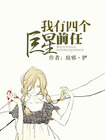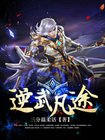They beheld before them a great field of battle where Christians and Moslems were engaged in deadly conflict. They1 Scimeters: curved swords used by Arabs and other Oriental people. 2 Cymbal: a musical instrument.
heard the rush and tramp of steeds, the blast of trumpet, the clash of cymbal, and the stormy din of a thousand drums. There was the clash of swords and maces1 and battle-axes, with the whistling of arrows and the hurling of darts and lances.
The Christians gave way before the foe; the infidels pressed upon them and put them to utter rout2. The standard of the Cross was cast down, the banner of Spain was trodden under foot, the air resounded with shouts of triumph, with yells of fury, and with the groans of dying men. Amidst the flying squad rons King Roderick beheld a crowned warrior whose back was toward him, but whose armor and device were his own, and who was mounted on a white steed that resembled his own war-horse, Orelia. In the confusion of the flight the warrior was dismounted and was no longer to be seen, and Orelia galloped wildly through the field of battle without a rider. Roderiek stayed to see no more, but rushed from the fatal hall followed by his terrified attendants. They fled through the outer chamber, where the gigantic figure with the whirling mace had disappeared; and on issuing into the open air they found the two ancient guardians of the tower lying dead at the portal, as though they had been crushed by some mighty blow. All nature, which had been clear and serene, was now in wild uproar. The heavens were darkened by heavy clouds; loud bursts of thunder rent the air, and the earth was deluged with rain and rattling hail.
1Maces: heavy war clubs.
2Rout: defeat; confused flight.
"The linen cloth rolled forth and spread out."The king ordered that the iron portal should be closed; but the door was immovable, and the cavaliers were dismayed by the tremendous turmoil and the mingled shouts and groans that continued to prevail within. The king and his train hastened back to Toledo, pursued and pelted by the tempest. The mountains shook and echoed with the thunder, trees were uprooted and blown down, and the Tagus raged and roared and flowed above its banks. It seemed to the affrighted courtiers as if the phantom legions of the tower had issued forth and mingled with the storm; for amidst the claps of thunder and the howling of the wind, they fancied they heard the sound of the drums and trumpets, the shouts of armies, and the rush of steeds. Thus beaten by tempest and overwhelmed with horror, the king and his courtiers arrived at Toledo, clattering across the bridge of the Tagus and entering the gate in headlong confusion, as though theyhad been pursued by an enemy.
In the morning the heavens were again serene and all nature was restored to tranquillity. The king, therefore, issued forth with his cavaliers and took the road to the tower, followed by a great multitude, for he was anxious once more to close the iron door and shut up those evils that threatened to overwhelm the land.
But lo! on coming in sight of the tower a new wonder met their eyes. An eagle appeared high in the air, seeming to descend from heaven. He bore in his beak a burning brand, and lighting on the summit of the tower fanned the fire with his wings. In a little while the edifice burst forth into a blaze, as though it had been built of rosin, and the flames mounted into the air with a brilliancy more dazzling than the sun; nor did they cease until every stone was consumed and the whole was reduced to a heap of ashes.
Then there came a vast flight of birds, small of size and sable of hue, darkening the sky like a cloud; and they descended and wheeled in circles round the ashes, causing so great a wind with their wings that the whole was borne up into the air and scattered throughout all Spain, and wherever a particle of those ashes fell it was as a stain of blood.
It is furthermore recorded by ancient men and writers of former days, that all those on whom this dust fell were afterward slain in battle when the country was conquered by the Arabs, and that the destruction of this necromantic tower was a sign and token of the coming perdition1 of Spain.
1 Perdition: ruin; destruction.















